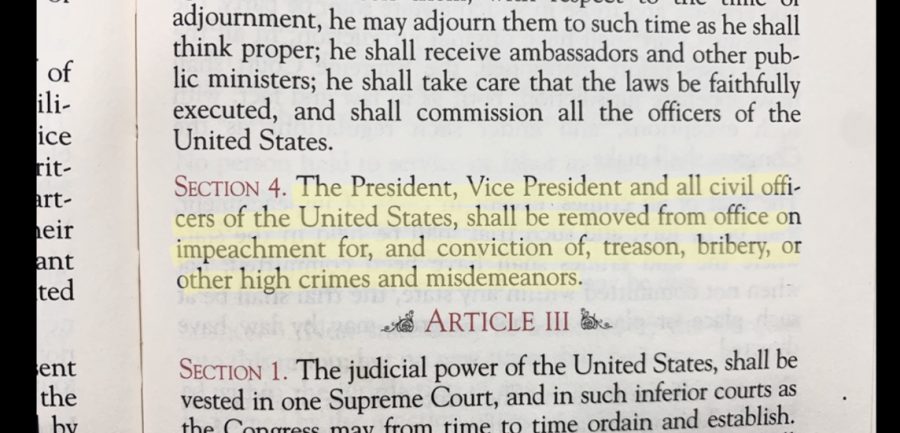Impeachment Inquiry: The History, the Process, the Allegations
With an impeachment inquiry underway, what does it mean for President Trump?
In the last two weeks, President Donald Trump has joined the ranks of presidents who have been the subject of an impeachment inquiry. This list includes only four US presidents, of which two were impeached. However, the term impeachment and the process it entails is often confused in conversation. So, here is a breakdown:
Impeachment inquires, impeachment, and removal from office all describe different and distinct stages in the impeachment process. As support for impeachment grows in the polls, it is necessary to examine what impeachment has meant in the past, and what it might mean for the future of this president.
On September 24, Speaker of the House Nancy Pelosi (D-CA) announced that an impeachment inquiry by six house committees would take place into President Trump and his administration. This move, supported by the significant majority of Congressional Democrats, was met with fierce opposition by Congressional Republicans under the voice of House Minority Leader Kevin McCarthy (R-CA). In the coming months, standing House committees will investigate the Trump administration, including the president, and look for any wrongdoing.
Impeachment Process and History
The process of impeachment is laid out in Article 1, Section 2, Clause 5 of the United States Constitution. Impeachment is equatable to the indictment of a civilian; the civilian is not yet proven guilty but is charged with a crime.
Impeachment begins with an impeachment inquiry in the House of Representatives. Hearings are held and subpoenas are issued during this inquiry. If the evidence gathered from the previous step is sufficient, the Speaker may bring articles of impeachment, provided they have been voted out of committee, to a vote by the entire house. Impeachment articles require a majority to pass.
Once impeached, the official would move to trial in the Senate. In the case of the president, this trial is presided over by the Chief Justice. A two thirds majority is required to remove an official from office. This is not a criminal proceeding and has no further consequences other than the removal of the official from office and the possible barring from ever holding public office again.
The impeachment clause included in the Constitution is largely a result of Alexander Hamilton’s efforts. In Federalist 65, part of the Federalist Papers pushing for ratification of the Constitution, Hamilton lays out the necessity of an impeachment clause stating, impeachment is “a method of NATIONAL INQUEST into the conduct of public men,” designed to prevent “the abuse or violation of some public trust.”
The process of impeachment is also a result of Hamilton’s efforts. This process is largely taken from 1700s Britain. In Britain, impeachments occur in the House of Commons, the body elected by the people, and are examined by the non-elected House of Lords. Previous to 1914, US Senators were appointed by their respective state legislators, not elected as were the members of the House. Hamilton understood that impeachment would be political process and attempted to ensure that the process, as in Britain, would be led by “the people’s house.” For this reason Hamilton lobbied for impeachment to occur in the House of Representatives, and only to be examined in the Senate. These procedures remain to modern day.
Impeachment Support
Impeachment and impeachment inquiry has been largely regarded as a last resort, something that should not be attempted unless clear evidence of a crime is present. In the past, impeachment efforts undertaken with clear evidence, specifically in the case of President Clinton, were largely unpopular in the polls. This is not the case in the impeachment inquiry of President Trump. According to a recent POLITICO/Morning Consult poll the majority, 46%, not only support the impeachment inquiry, but support impeachment. In the same poll, 43% are opposed to impeachment, and 11% are undecided.
These numbers are truly unprecedented. At a similar point in the Nixon impeachment inquiry, Nixon had a majority of Americans opposing impeachment with a margin of 15%. President Clinton had the vast majority of American opposing impeachment, with a margin of 32%. Never before in American history have polling numbers shown that the majority of American support impeachment during an impeachment inquiry.
The Allegations
The investigation into President Trump and his administration began when the Director of National Intelligence refused to hand over a whistleblower report from a member of the intelligence community, because he was directed by the White House not to.
This report, eventually received by the House Intelligence committee, details President Trump’s alleged efforts to get the Ukrainian government to investigate Vice President and 2020 presidential candidate Joseph Biden and his son Hunter Biden. President Trump sought investigation by this foreign government into Hunter Biden’s business dealings as member of the board of the Ukrainian natural gas company Burisma Holdings. This report was headlined by a call involving President Trump and Secretary of State Mike Pompeo in which Trump asked the Ukrainian president to open an investigation eight times. President Trump’s personal lawyer, Rudy Guiliani, then allegedly followed up with Ukraine regarding information in the call. The report also notes that military aid authorized by congress to the Ukraine was being held up by the Trump administration at this time.
After the call became public, the administration deployed this aid. This has led to many accusations of Trump framing the situation as a quid pro quo, or wanting or extorting the Ukraine to give something in return for military aid. In this angle, the crimes possibly committed are extortion, bribery, campaign finance violation, conspiracy, and honest services fraud.
The second part of the investigation focuses on the aftermath of this call and the alleged efforts by White House staffers to conceal it. The recording of the call was placed on a highly classified code word server, somewhere staffers say a call of this level would not usually be on. The call was then allegedly erased elsewhere. In this angle, the crimes possibly committed are obstruction of justice and conspiracy.
The third angle of the investigation looks at Presidents Trump’s response to the report once it was released to the public. In a series of aggressive tweets and quotes, President Trump accused the Democratic Party of attempting to commit a coup and the Chairman of the House Intelligence Committee, the committee spearheading the investigation, Adam Shiff (D-MA) of committing treason. President Trump has also posted memes on social media degrading Shiff and tweeted personal degrading insults about him. It is important to note that the comments of President Trump stating Shiff helped the whistleblower write his complaint and had far earlier access to the report are unfounded.
The whistleblower’s council claims the president and his rhetoric have put his client in danger. President Trump was recorded speaking in private about the author of the whistleblower report: “Who’s the person that gave the whistleblower the information? Because that’s close to spy;” Trump said, “You know what we used to do in the old days, when we were smart, right? The spies and treason? We used to handle it a little differently than we do now.” Recently, the whistleblower’s council announced that he now represents multiple government officials who corroborated the initial report. The crimes possibly committed in this angle are witness intimidation and conspiracy.
Response and Next Steps
In response to the impeachment effort, President Trump has upped his usual aggressive rhetoric toward congressional Democrats and the press. While White House staffers appear to be working on organizing a clear defense, and President Trump has turned to social media, posting a mix of person insults towards political rivals, attack ads and tweets on Joe Biden, and messages of the positive impact of his presidency.
Senate Majority Leader Mitch McConnell (R-KY) has come to the defense of the president, but has supported the effort to release the whistleblower report to congress. He has stated that he is constitutionally bound to hold a trial if President Trump is impeached.
The Impeachment inquiry into the Trump administration is full speed ahead, with 6 committees currently performing an impeachment inquiry. Multiple subpoenas have been issued notably to the White House (for documents) and to Rudy Giuliani. The investigation is expected to continue into the coming months.

Jake is a senior at LRHS. This is his second year writing for The Lancer Ledger. He is a member of the Lakeland band and the robotics team. Outside...












